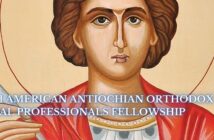Source: Public Orthodoxy
![]()
Amidst the culture wars, the word “traditionalist” has gained currency and has been co-opted in a variety of ways. Broadly, it is a self-naming mostly by those who identify as religious and are seemingly faithful to their religious tradition in the face of attacks either against religion in general or by others within their religious tradition who challenge various givens of that tradition. For the Orthodox Christian crowd, a very simple example would suffice: a self-named traditionalist would typically oppose the ordination of women to the diaconate, while a non-traditionalist—usually called, pejoratively, a liberal—might challenge the givenness of the non-ordination of women.
An extension of “traditionalist” is “traditional values,” which has come to mean a very select set of “values” related to gender and sexuality. “Traditional values” has very recently become a transnational slogan, which cuts across the East-West divide, since there are Westerners (American Evangelicals) making alliances with Easterners (Russian Orthodox actors) in order to advance “traditional values” through established national and international legal structures.
The meaning of “traditional values” has been further amplified with the neologism: “Orthodox morality.” I say neologism, because never in the history of Christianity—at least Orthodox Christianity—has the word “Orthodox” functioned as an adjective for “morality.” Never. This neologism has a very non-traditionalist—dare I say, modern—ring to it. It may appeal to those attracted to a version of the so-called “Benedict Option,” but this Donatist logic of purity was condemned a long time ago by the Church.
My thesis is very simple: the use of the word “traditionalist” and its derivative forms (“Orthodox morality,” “traditional values”) is philosophically untenable, i.e., it’s wrong. Why? Because we are all traditionalists. How? Because it is impossible to exist as a human being without tradition. Put another way, traditionless existence is impossible. Put yet another way, humans exist not simply in and through, but as tradition.
If this thesis is unexpected, what may be more shocking is the fact that it’s actually been around for a long time; I’m definitely not the first to articulate it. I’m simply repeating an axiom that has gained a fairly wide philosophical consensus and was probably most famously articulated by the philosopher, Alasdair MacIntyre, whose work many of the so-called traditionalists appropriate. They do so selectively, because they fail to mention that for MacIntyre, everything is tradition, even the liberalism against which the “traditionalists” self-define. The fact that liberal democracy itself is a tradition sustained by particular civic practices was definitively shown by the Princeton philosopher, Jeffrey Stout.
At this point, a “traditionalist” might accept that all is tradition and that we are all traditionalists but would probably argue that the use of the word “traditionalist” is meant specifically against those who identify with the shared religious tradition but are trying to change it in order to adapt to the current culture and to be more relevant. They might conclude that those who argue, for example, that women should be ordained to the diaconate contaminate the Orthodox tradition with the godless liberal tradition. This approach would actually be more philosophically and theologically tenable, but if that is what’s being claimed, then the word “traditionalist” needs an adjective, like “pure,” in order to indicate what kind of traditionalism is being evoked.
This argument, however, is still not quite reflective of the reality. How would one describe someone who practices Orthodox Christianity faithfully, accepts the authority of the dogmatic proclamations of the Ecumenical Councils, believes that Jesus is fully divine and fully human, that God became human so that humans can become gods (theosis), and on the basis of these particular “traditional” beliefs argues that discussion and change are possible within the tradition on issues of, say, gender and sexuality? If there is no such thing as traditionless thinking, and if these arguments are being made based on thinking in and through the beliefs of the Orthodox tradition, is this not “Orthodox traditionalism”?
One could argue that simply making claims on gender and sexuality is an infiltration of a mutually exclusive tradition. But how is that the case if the arguments made are actually based on theological principles and beliefs constitutive of Orthodoxy? And if one claims that the very fact that we are discussing these issues is only because of liberalism, then the counter-argument is the historical fact that there were pagan philosophers challenging Christian thinkers with questions. If, in fact, the source of the questions disqualifies those very questions, then on that basis, the entire history of Christian thought should be rejected.
What these “traditionalists” often forget or choose to ignore is that Alasdair MacIntyre explicitly stated that while traditions themselves are often differentiated by distinct epistemic presuppositions, a tradition must open itself to all questions and challenges if it is to survive as a tradition. The viability of a tradition will depend on how well it can answer the challenges and questions of a particular era while incorporating the best insights of a rival tradition in such a way that does not threaten the internal coherency of the tradition. This does not mean a tradition must change its givens; but, if those givens fail to be credible responses on the basis of the tradition’s own non-negotiable presuppositions, then that tradition will, in fact, not survive.
What the word “traditionalist” muddles is the real debate, which is not whether one is a traditionalist or non-traditionalist, faithful or non-faithful. The fault line exists on disagreement over the implications of presuppositions or beliefs held in common by those who adhere to the tradition. To return to our example, when I argue that the Church should allow women deacons, it’s not to make Orthodoxy more relevant, but it’s because there does not exist a good theological argument consistent with the belief in God’s Incarnation (which includes the Cross and Resurrection) that would preclude women serving the Church in this way. That would also serve as my guiding light when thinking about issues of sexuality.
One thing is for certain: the non-religious would, at least, consider me a traditionalist; but, their use of the term is simply the flip side of the bad religious use of the term. Again, it’s not about being a traditionalist versus a non-traditionalist; it’s about identifying what kind of traditionalist we are. For the record, I am an Incarnational traditionalist. I suspect those with whom I disagree on what is discussable in the Orthodox tradition share this epistemic presupposition. Our real debate is over the acceptable amount of diversity that can exist among those who share a common dogmatic tradition.
We should, thus, recognize our common presuppositions; affirm those common presuppositions, especially the dogmas, as ground rules for debate; and we need to stop using words like “traditionalist,” “traditional values,” and “Orthodox morality,” which only obfuscate what we share in common or, at worst, become rhetorical tools for demonization. These words are conversation stoppers, which, for anyone who knows the history of Christianity, is actually antithetical to the living Tradition.
Aristotle Papanikolaou is the Archbishop Demetrios Chair in Orthodox Theology and Culture and the Co-Director of the Orthodox Christian Studies Center of Fordham University.
Public Orthodoxy seeks to promote conversation by providing a forum for diverse perspectives on contemporary issues related to Orthodox Christianity. The positions expressed in this essay are solely the author’s and do not necessarily represent the views of the editors or the Orthodox Christian Studies Center.



